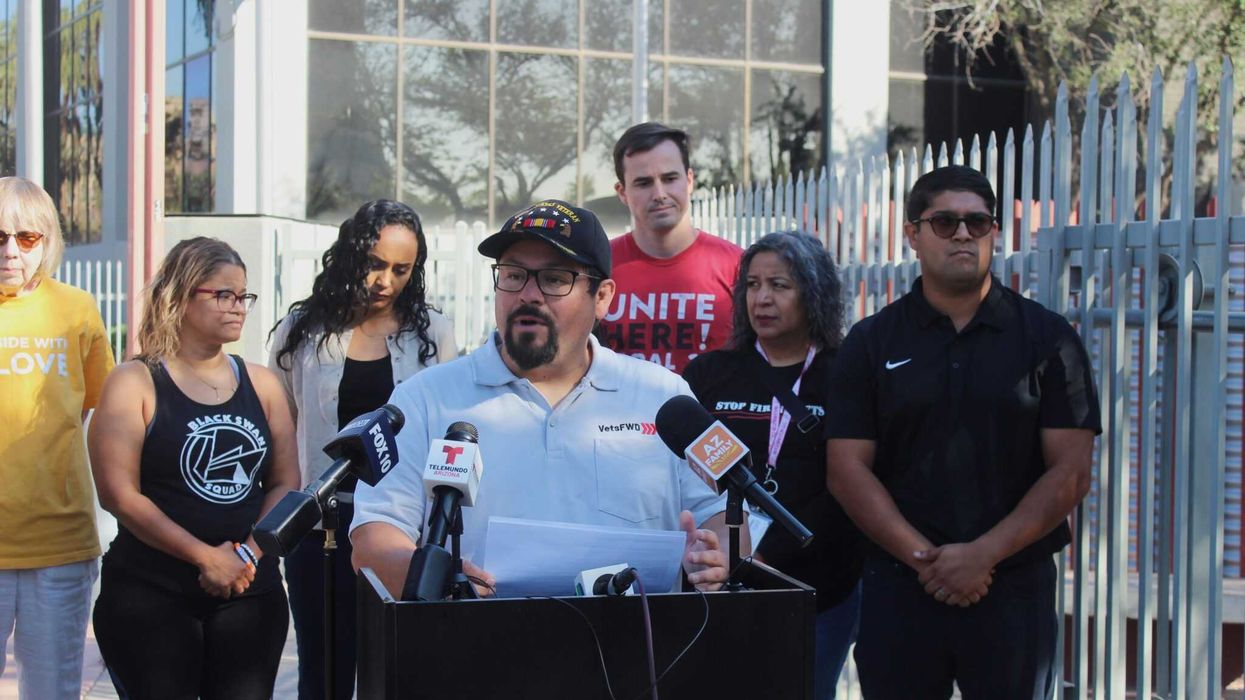In the early morning hours of Nov. 14, after almost a year of being shuffled between immigration detention centers and once nearly being sent to Venezuela, Iraq war vet José Barco was deported from Arizona.
His family still doesn’t know where.
Ricardo Reyes, the executive director of VetsForward, a progressive veterans advocacy organization, called Barco’s removal a “national disgrace.”
“When one veteran is deported, every single veteran is dishonored,” he said. “When a nation abandons its warriors it undermines the very values we swore to defend.”
Barco, who was born in Venezuela but has lived in the U.S. since he was 4 years old, served two tours in Iraq and was awarded a Purple Heart for saving two soldiers who were pinned under a burning Humvee after an improvised explosive device was detonated. During that rescue, Barco sustained severe burns and a traumatic brain injury.
In 2008, Barco was convicted of two counts of attempted first-degree murder and one count of menacing after he fired a handgun into a crowd of teenagers at a house party in Colorado Springs, Colorado. A bullet hit 19-year-old Ginny Clemens, who was pregnant.
Barco’s supporters say a combination of PTSD, his brain injury — which was worsened by several more explosions during his second combat tour — and his struggles with alcoholism and attempts to self-medicate contributed to his actions that day. He has said he has no memory of what happened.
Barco was sentenced to 52 years in prison, but was released on January 21 – a day after Trump took office – after 15 years due to good behavior. On the same day that he walked out of prison, hopeful about meeting his daughter for the first time, ICE agents were waiting for him. What followed were months of detention, as he was transferred between ICE facilities in Colorado and Texas and, finally, the immigration detention center in Florence, Ariz.
Part of what prolonged Barco’s imprisonment was uncertainty around where he should be deported to. In April, the Trump administration flew Barco and several dozen other Venezuelan nationals to the South American country, but Venezuelan officials refused to take him, questioning his birth certificate and Cuban accent, so he was returned to Texas.
While Barco was born in Venezuela, his parents were exiles from Cuba, where his father was once held as a political prisoner. When Barco was a toddler, his family left Venezuela and sought asylum in the United States.
Barco’s wife says she fears for his safety if he is deported to either country. As of Friday afternoon, Reyes, who is in contact with Barco’s family, said it was still unclear where he had been sent.
ICE did not respond to a question about where Barco was sent.
Speaking in front of ICE’s Phoenix Field Office on Friday morning, state Rep. Cesar Aguilar denounced the increase in veteran deportations under Trump.
“‘Deported veteran’ should not even be in a sentence,” the Phoenix Democrat said. “When you serve this country, you should be given citizenship.”
While no exact figures are available, an estimated 10,000 veterans were deported between January and June, according to a letter sent to the U.S. Department of Homeland Security by members of Congress concerned about the trend.
During Biden’s presidency, ICE was directed to take into consideration a noncitizen’s military service and not to initiate removal proceedings against them if they are eligible for naturalization, unless significant aggravating factors exist. That guidance was rescinded in an April memo, which emphasized that “military service alone does not automatically exempt aliens from the consequences of violating U.S. immigration laws.”
Only residency is required to enlist in the U.S. military. But military service offers a pathway to citizenship. In court filings, Barco’s commanding officer wrote that he helped Barco complete and submit an application for naturalization in 2006. At some point, that packet got lost.
Reyes faults the government for that missing application, and on Friday criticized ICE for barring discussion of Barco’s military service during deportation hearings.
“A man who bled — a man who literally burned alive for this country — was never allowed to speak about the very service that we claim as America to honor,” he said.
Reyes, who is also a veteran, lambasted the move to expel people who have served in the military from the country as “outrageous” and called on the Trump administration to bring Barco and others back.
“It’s a stab in the back to deport any veteran, but especially a combat veteran who stood in harm’s way for this nation while others stayed home — while others got a doctor’s note claiming they have bone spurs,” Reyes said, in a dig at Trump, who avoided being drafted during the Vietnam war because he was diagnosed with bone spurs in his heels.


